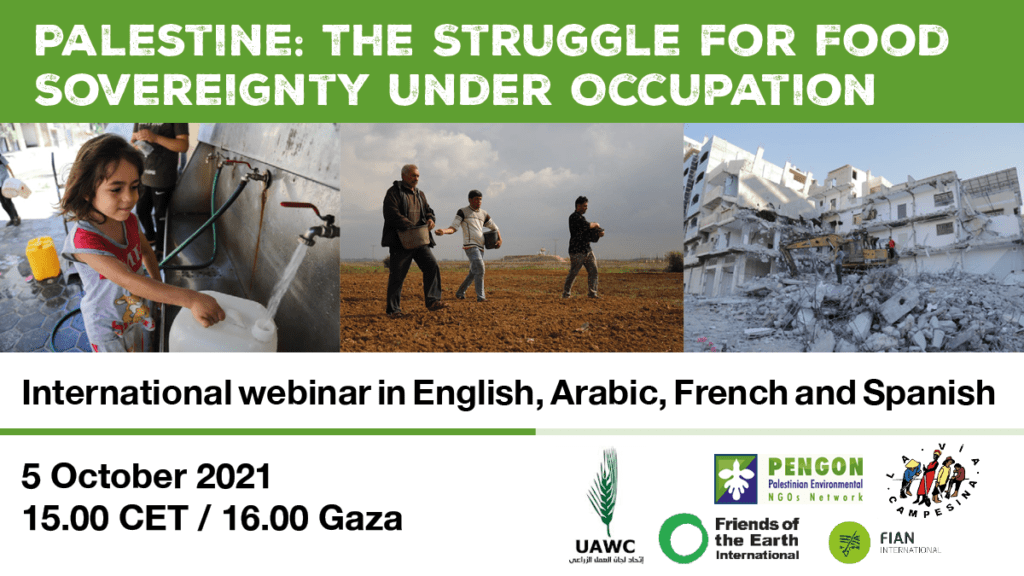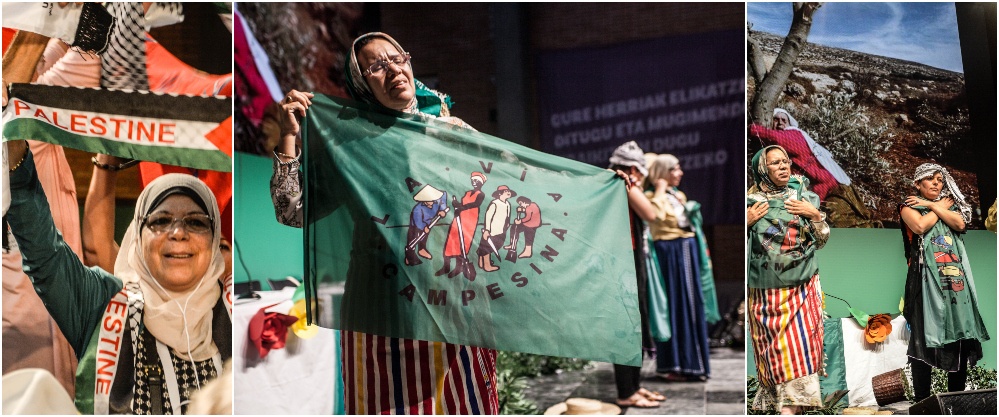
Link to register on Zoom: https://viacampesina.zoom.us/webinar/register/WN_nshanvHHSGGF7GrG-MsN5w
In October 2021, we are celebrating 25 years of defining[1], building and fighting for Food Sovereignty all over the world. The concept of Food Sovereignty was developed by La Via Campesina and brought to public debate during the World Food Summit in 1996 as an alternative to neoliberal policies. Since then, peasant organisations, unions and social movements have been fighting for the true implementation of this concept, as the real solution to end world hunger.
Food Sovereignty encompasses the right of peoples to healthy and culturally appropriate food produced through ecologically sound and sustainable methods, and their right to define their own food and agriculture systems. The concept asserts the right of peoples to control their food resources including land, water, seeds, pastures, animal and fish stocks.
More than just a concept, Food Sovereignty is a strategy for development and a way of life. It looks at the type of food we eat, the conditions in which it is produced, and its relationships with the environment and local community. It is a strategy for struggle against agribusiness, monoculture, crop standardisation and exploitation of peasants and agricultural workers, within the hyper-productivist, profit-driven, capitalist model of food production.
For Palestinians, the struggle for Food Sovereignty is an important part of their struggle against a military occupation which has full control over their natural resources, including land, water, seeds and fisheries.
In Gaza specifically, it is a matter of survival.
The Israeli blockade imposed in 2007 turned Gaza in to an extreme form of open-air prison, where people struggle every day to feed themselves and make a living, let alone adapt to climate change and crises like the Covid-19 pandemic. Israel’s subsequent offensives in 2008, 2012, 2014 and 2021 caused mass destruction of human life and infrastructure. In 2012, the United Nations already stated that the Gaza Strip will not be liveable[2] by 2020 unless urgent action is taken to improve living conditions including water supply, electricity, health and schooling.
During the Israeli military offensive on the Gaza Strip for 12 days in May 2021, Israeli Forces continued to disregard International and Humanitarian Laws by imposing collective punishment on Palestinians in Gaza. As of 21 May, Israel’s massacres have killed[3] over 260 civilians including 60 children and 40 women. More than 1,900 people have been injured, more than 60% of them children and women. During this intensified assault on Gaza, seven farmers were killed on their land with missiles bombed from Israeli aircrafts. There has been around $27 million in damage, including demolition of 490 agricultural facilities such as greenhouses, lands and poultry farms. According to the Union of Agricultural Work Committees (UAWC)[4] the destruction entailed: 30,000 km of irrigation networks and transmission lines, 50 solar energy units, 190 ponds, 500 dunums (aces) of crops, 2,100 greenhouses, 20 wells, 50 fishing boats, 220 missile holes in farmlands and 200-250 farm animal deaths.
The Israeli occupation deprives Palestinians of their right to food, right to life and right to development. 32.7%[5] of Palestinians overall are food insecure. In the Gaza strip, this figure rises to 68.5%. Israeli occupation still prevents the entry of goods and raw materials, as well as the export of many industrial and agricultural products.
After 15 years of suffocation, it is surely time for international institutions to carry out their legal and humanitarian duties towards the Palestinians and ensure that their basic rights are protected.
In this webinar, we will hear from farmers and fisherfolks on the frontline in Gaza and the West Bank, as well as international experts and activists.
We invite you to join us to learn more about Palestinian reality and struggle for rights.
See more information about the speakers, download Invitation in PDF
[1] https://viacampesina.org/en/food-sovereignty-25-years-in-the-making/
[2] https://www.reuters.com/article/us-palestinians-gaza-un-idUSBRE87Q0OE20120827
[3] https://uawc-pal.org/pdf/UAWC’s%20statement%20on%20the%20recent%20escalations%20in%20Gaza.pdf
[4] https://uawc-pal.org/pdf/UAWC’s%20statement%20on%20the%20recent%20escalations%20in%20Gaza.pdf
[5] https://www.wfp.org/countries/palestine

